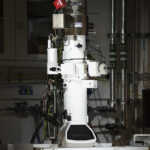
A collaborative team lead by Chris Russo’s group in the LMB’s Structural Studies Division has developed a new electron cryo-microscope, capable of solving atomic structures at a fraction of the energy and cost of existing models.
MRC Laboratory of Molecular Biology
One of the world's leading research institutes, our scientists are working to advance understanding of biological processes at the molecular level - providing the knowledge needed to solve key problems in human health.